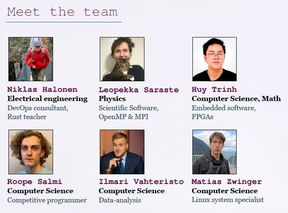Finnish student team Revontuli took the third place in an international student supercomputer competition

CSC fielded Finland's first team in the international Student Cluster Competition (SCC), whose final was held in November 4-6. Team Revontuli (northern lights in Finnish) won the HPL Hero Run Challenge and finished 3rd overall among 10 university teams from UK, USA, Australia, Indonesia and China. The winner and runner-up teams were both from China, which has traditionally been very strong in SCC.
'The competition was fierce but we kept our cool during the proceedings and managed to get a good overall score. We’re very happy with the final results. We really hope this paves the way for more Finnish teams to follow and excel in these kinds of competitions,' says Leopekka Saraste on behalf of the team.
In the competition, teams of six undergraduate students complete a variety of computing-related tasks in their own small clusters. The competition lasts 48 hours without breaks and no outside assistance is allowed.
Team Revontuli consisted of six students from four different Finnish universities and an advisor from CSC:
Niklas Halonen, Electrical Engineering, Aalto University,
Leopekka Saraste, Physics, University of Helsinki,
Huy Trinh, Computer Science, Mathematics, Tampere University,
Roope Salmi, Computer Science, University of Helsinki,
Ilmari Vahteristo, Computer Science, LUT University
Matias Zwinger, Computer Science, Aalto University
Jussi Enkovaara, team advisor and Aalto alumnus, Senior HPC Specialist, CSC
The Revontuli team participated in the virtual IndySCC version of the SCC competition, where teams used a common cloud platform provided by the organizers instead of their own micro clusters.
Before the final competition the teams had a number of homework assignments and most notably the so called HPL Hero Run challenge, which was a 24h dash in October 25-26. The goal of the HPL Hero Run was to achieve the best possible performance with the Linpack benchmark on 300 cloud nodes and Team Revontuli dominated the competition with a 144 Tflops result while the next best team achieved only 109 Tflops.
In the final the team worked on NAMD and MiniVite applications, which were announced in advance, and HPCG, which was the so-called mystery application and announced only after the start of the final.
'We are of course extremely happy with the performance of the team, especially as this was our first try. So congratulations to the guys for the job well done! It was very nice to see how they utilized their different strengths and skills and managed the competition sharing responsibilities and work. Our primary goal was to raise awareness for high-performance computing among undergraduate students and the success of the team was a sweet bonus. “We are definitively going to do it again!' says Jussi Heikonen, Aalto alumnus and one of the team’s coaches at CSC.
Read more news

MyCourses additional maintenance downtime on Tuesday, 24 March 2026, from 9:00 to 16:00
Service break in MyCourses Tue 24.3.2026.Eden Telila's master's thesis contributed to Ramboll's geotechnical toolkit
Geoengineering alum Eden Telila helped Ramboll automate manual tasks.
Doc+ connects research impact with career direction - join the events!
Doc+ panels have brought together wide audiences in February and continue in March with two events to discuss doctoral careers and their diversity.






